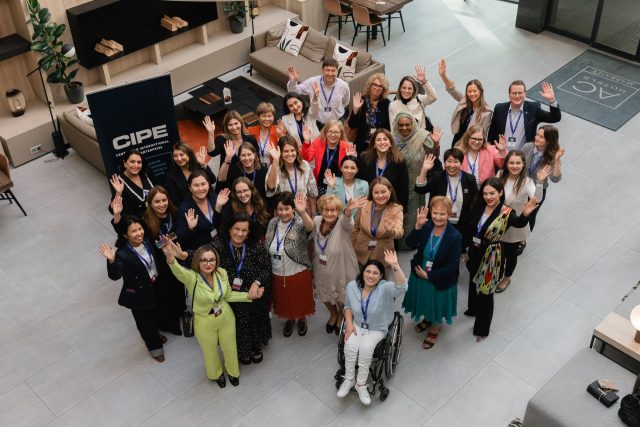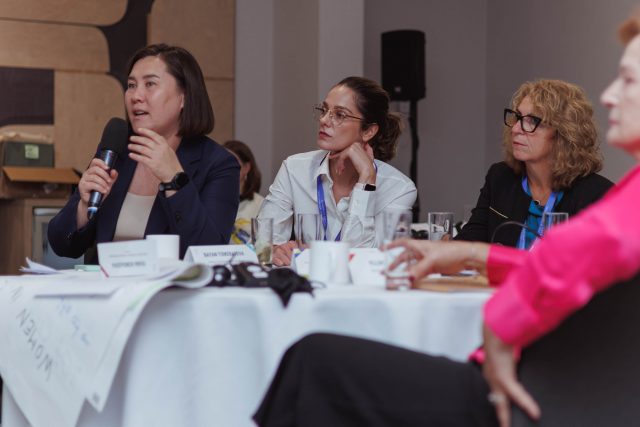Women’s economic empowerment is a topic many are eager to discuss. Political candidates tout their commitment to the cause. My friends call me to discuss how to negotiate better, more equitable compensation; how to deal with being the only woman in the room; and how to avoid being seen as the one who should fetch everyone’s coffee or be treated as the assistant when they hold the title of Executive Vice President. When I dine with friends, the topic comes up as part of the natural flow of the conversation. Women want to know how other women manage such situations, like the need within some spaces for their viewpoints to be affirmed by men before they are accepted as fact by others.

My reading list includes books on Mileva Marić-Einstein’s overlooked contributions to physics, the plight of women stunt reporters, and even The Sisterhood which highlights how the intelligence community repeatedly marginalized the advice of women to the detriment of public safety. Books like these bring into the sunlight the gaps we suspected existed but now have the evidence to prove. When women are excluded or marginalized, society suffers, and prosperity is constrained. Any one of us could do a quick search and find facts like the following provided by the UN:
- Around 2.4 billion women of working age are not afforded equal economic opportunity, as noted in this piece: Nearly 2.4 Billion Women Globally Don’t Have Same Economic Rights as Men.
- 178 countries keep legal barriers that prevent women’s full economic participation.
Recently, I spent time with women who actively engage to change these statistics. These women are not dissuaded by the challenges we still face, but rather, create the opportunities others need for a more equitable present and future. CIPE’s Center for Women’s Economic Empowerment (CWEE) works with women in business associations around the world to ensure women can build a business and use their education to establish stronger, more resilient economies. CWEE supports women creating the change that will ensure those who had previously been left out are now valued contributors.
When women are excluded or marginalized, society suffers, and prosperity is constrained.
In mid-September, CIPE hosted an advocacy workshop in Bratislava, Slovakia, which brought together partners from business associations in 14 countries. CIPE hosted this workshop under the “Strengthening the Entrepreneurial Ecosystem by Networking Regional Women’s Chambers of Commerce and Business Associations” (WE-Champs) project, funded by the U.S. Department of State Secretary’s Office of Global Women’s Issues. Leaders from disparate backgrounds joined one another to share best practices, successes, and challenges. They learned how to create advocacy campaigns, build partnerships and coalitions, and use their talents to lead change. These are women who sacrifice and, in many cases, are taking the critical first steps toward progress in their own countries by knocking against barriers like those mentioned above.
These leaders drive legislative reform and change regulations to create opportunity and more inclusive economies. One such leader discussed how they ran their advocacy playbook and in 2023 increased employment opportunities for women across Azerbaijan. Soviet-era legislation barred women’s participation in over 620 occupations. This women’s group pushed back against assertions that these occupations were beyond women’s ability, too dangerous, labor intensive, and should remain closed to women. CIPE’s partner built a coalition and successfully advocated for over 500 occupations to be removed from these restrictions, leaving only those deemed too dangerous for pregnant women. This creates real opportunity not just for women and their families, but also the economy of Azerbaijan.
These efforts represent real change. They are encouraging change. They are replicable change. And they were all led by women.
A Kazakhstan partner wanted to support women to become more involved in politics. It trained 300 women to run for office and 100 of them won, many of which at the local level. These elected women have brought social issues to the forefront. Education, for example, is a key area where their impact is being realized. Kazakhstan lacks enough schools. Often one grade will have thirty classes with dozens of students in each classroom, overwhelming instructors and making learning a challenge. These locally elected women are transforming the education landscape by building schools and the business landscape by educating women. They have also raised healthcare to the forefront of the debate. A healthy, educated society can help build a more prosperous country.
These leaders know that changing legislation is only the first step. CIPE’s partner in Moldova got legislation passed to protect people from gender-based harassment, helping ensure a more equitable and safe working environment. CIPE’s partner has now shifted its efforts to educate people on their rights to therefore embed the change into the culture and preserve opportunities for women in the workplace.
These efforts represent real change. They are encouraging change. They are replicable change. And they were all led by women.

Sharing stories like these at networking events is so important. They enable similarly placed leaders to learn from one another and be encouraged to continue the course. Outside the workshop, I was able to meet leaders from across Slovakia who are passionate about women’s economic empowerment. We discussed how to get women more involved in finance, the tech sector, and government. They were also encouraged by the work of these business association leaders from around the world.
One association leader from Bosnia and Herzegovina said, “[Women] face many challenges, one of the greatest is gender bias…but it’s priceless to see a woman achieve her goal and grow into a confident business leader.” The work being done through CWEE and its partners is proving that social progress is possible, and, in some cases, it is being realized. However, it will take everyone working together to create the opportunities that foster inclusive economic growth for business leaders worldwide.
To continue learning about how CIPE’s Center for Women’s Economic Empowerment is turning discussions into action, visit its website and learn how you can get involved. To learn more on how WE-Champs partners have improved their management and operations to better serve their women business members, see this article.
Published Date: October 14, 2024
